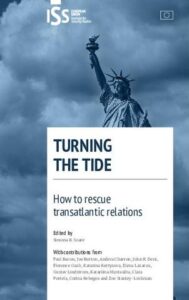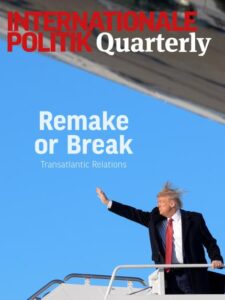 If current polls prove accurate, Europe can expect a concerted effort on Capitol Hill to rebuild transatlantic relations, David M. Herszenhorn writes for Politico.
If current polls prove accurate, Europe can expect a concerted effort on Capitol Hill to rebuild transatlantic relations, David M. Herszenhorn writes for Politico.
Arguably, nothing is more vital to saving the liberal world order than strong transatlantic relations, Kennedy Lee writes for New Eastern Europe. A strong transatlantic alliance has the potential to play a crucial role in Eastern Europe in the coming months, especially as it relates to Belarus, in the wake of the falsified August 9th presidential elections.
The idea that the world’s stability and prosperity is defined primarily by a partnership between Europeans and Americans is called Atlanticism or transatlanticism, analyst Madeleine Schwartz observed. For the politicians, professors, thinktank pundits and journalists for whom “Atlanticist” is a badge of honour, an end to this partnership is not just a geopolitical issue, but a threat to liberalism and any hopes of political betterment around the world.
Democracy, free speech, anti-totalitarianism, constitutionalism and free trade that manages to enrich all of its participants – these ideals, to the Atlanticists, depend on the close relationship between the US and Europe. As goes the transatlantic relationship, so goes the possibility of western progress, she wrote for The Guardian.
There has been a recalibration of the US policy toolbox in Central and Eastern Europe, supporting democracy projects in the region in the face of both domestic and external (especially Russian) attempts at subversion, say analysts Igor Merheim-Eyre and Łukasz Janulewicz.
 Although its presence was scaled-down following the CEE countries’ accession to the EU, it was the National Endowment for Democracy (NED) and its core institutes (such as the International Republican Institute) who have spurred European response to Russian information warfare in the CEE and beyond (increasingly, also to Chinese influence), engaged state institutions, political actors and civil society in much-needed dialogue, they write for Visegrad Insight:
Although its presence was scaled-down following the CEE countries’ accession to the EU, it was the National Endowment for Democracy (NED) and its core institutes (such as the International Republican Institute) who have spurred European response to Russian information warfare in the CEE and beyond (increasingly, also to Chinese influence), engaged state institutions, political actors and civil society in much-needed dialogue, they write for Visegrad Insight:
They provided vital funding, training and other forms of support to local civil society organisations, journalists and political parties not just to deal with foreign interference but address the democratic malaise in the CEE countries. In 2018, the NED and its institutes provided over three million dollars to support civil society and non-governmental organisations in CEE and, in 2020, NED supported 1,995 projects globally with a budget of 254 million dollars – the highest in its 36-years’ old history.
NED remains effectively the only stable mechanism for supporting democracy projects in the region while seeking to protect US investment in the countries’ democracies made over the past three decades, Merheim-Eyre and Janulewicz assert.
![]() But Europeans are likely to assert their autonomy irrespective of the US election results, The Post reports. Europe has had a taste of life in a post-American world, and that may shape its future, some analysts say.
But Europeans are likely to assert their autonomy irrespective of the US election results, The Post reports. Europe has had a taste of life in a post-American world, and that may shape its future, some analysts say.
“Europeans realized what they have to lose if the U.S. really disengages,” said Daniela Schwarzer, director of the German Council on Foreign Relations, who also advises Borrell. “We are not anywhere close to European sovereignty or strategic autonomy, but the awareness of what Europe is lacking is there. That’s the new mind-set.”







